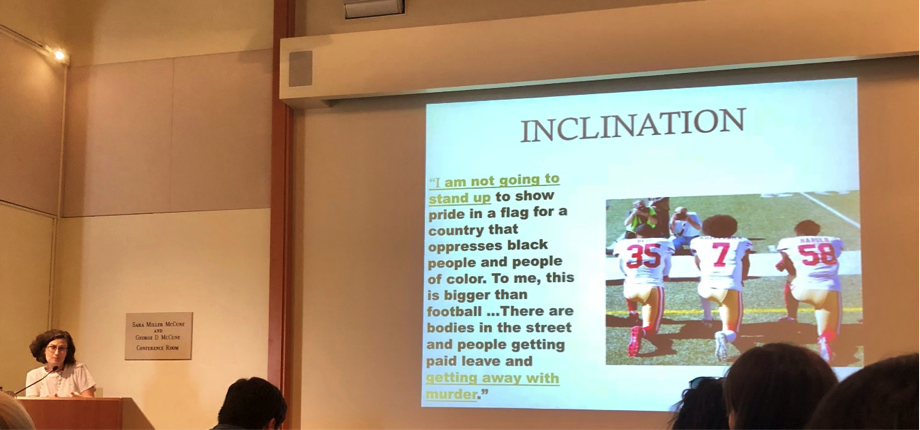By Sadie Wilbur
Brown University professor Bonnie Honig explains why refusal is an important part of democratic citizenship in her talk, “Postures of Refusal: From Antigone to Kaepernick,” the finale of the 2018 Critical Issues in America series: Changing Faces of U.S Citizenship.
More than half a century ago, boxing heavyweight champion Muhammad Ali refused to be inducted into the U.S. Army during the Vietnam War.
Now, the public watches as a modern version of that protest, initiated in 2016 by National Football League player Colin Kaepernick, extends into its third year.
Kaepernick’s decision to kneel in silence, rather than stand during the national anthem to protest racial injustice, is part of a long tradition in American citizenship, says Brown University professor Bonnie Honig.
Political and cultural theorist Bonnie Honig poses for a photo. Image courtesy of Brown University.
It sparked a nationwide debate about the First Amendment, citizenship, and race, among other topics. “This man is one of the changing faces of U.S. citizenship,” Honig said in a recent UC Santa Barbara lecture titled “Postures of Refusal: From Antigone to Kaepernick.” The talk marked the finale of this year’s Critical Issues in America series: Changing Faces of U.S. Citizenship.
Running continuously since 1995, the Critical Issues in America series examines topics of contemporary national significance through a multidisciplinary lens and is sponsored by the College of Letters and Science, the Chancellor’s office and the Academic Senate.
Throughout the 2018 series, faculty, students and guest speakers from across the country explored the idea of citizenship in the United States; how it is shaped and regulated, the challenges it faces, and the potential strategies for strengthening its promise.
“We had an inkling that citizenship and immigration might become important issues, but we had no idea what the next few years would bring, how much citizenship would come under threat, and ideas of it put under pressure,” said Helen Morales, the Argyropoulos Chair in Hellenic Studies at UC Santa Barbara and the co-organizer of the 2018 Critical Issues in America series.
“This series has helped us understand many of these changes, but we can’t possibly address everything that needs to be addressed,” said Morales. “We end our series, not on a gloomy note, but on a high note, thinking about resistance, protest and refusal.”
“We end our series, not on a gloomy note, but on a high note, thinking about resistance, protest and refusal.”
Honig’s research represents an important addition to the growing body of political theory that uses Greek tragedy as a platform, said Paige Digeser, a professor of Political Science and Associate Dean of the Graduate Division at UC Santa Barbara. Honig’s work on refusal is “eclectic, thought-provoking, influential,” said Digeser, who studied with Honig at Johns Hopkins University.
Honig, who teaches in the departments of Modern Culture and Media, and Political Science at Brown University, examined the cultural assumptions associated with refusal. She said refusal is most often associated with vertical postures, while inclining postures, in which the figure is leaning in, are associated with maternal care.
Honig explored the inclined, feminine aspect by analyzing the notion of refusal in Sophocles’ play “Antigone,” Euripides’ play “Bacchae,” and Leonardo da Vinci’s painting “Madonna.” She extended it through the contemporary era by looking at speeches and interviews by professional boxer Muhammad Ali and NFL player Kaepernick.
Kaepernick’s kneeling protest, a posture of inclination, demonstrates “a care for citizenship,” while at the same time “rejects demand from authority and compliance,” Honig explained.
Decades before Kaepernick took a knee during the national anthem, world champion boxer Muhammad Ali publicly opposed the Vietnam War as a conscientious objector. “Kaepernick has been compared to Muhammad Ali, the heavy-weight boxing champion in the 1960s and 70s, who was also famous for his own protests at the time,” continued Honig.
After refusing to step forward for induction into the U.S. Army, Ali was stripped of his heavyweight title and banned from boxing for over three years. However, support for Ali grew as public attitudes turned against the war, and in 1971 the Supreme Court reversed his conviction in a unanimous decision. “The same thing is happening now to Kaepernick,” said Honig.
Kaepernick, who opted out of his contract with the San Francisco 49ers, remains unsigned despite outstanding on-field performance. “It is unclear whether Kaepernick will ever get to play professional football again,” Honig said.
Throughout U.S. history, protest has served a vital role in the shaping of the country. “Refusal is an important part of democratic citizenship,” Honig said.
Sadie Wilbur is a fourth-year Communication student who covered this event for her Writing course in Journalism for Web and Social Media.




